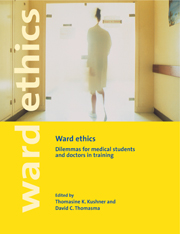Book contents
- Frontmatter
- Contents
- Acknowledgments
- List of contributors
- Prologue. Breaking the silence
- Letter from a young doctor
- Part I On caring for patients
- Section 2 Problems in truth-telling
- Section 3 Setting boundaries
- Part II On becoming a “team player”: searching for esprit de corps and conflicts of socialization
- Section 4 Abuse and mistreatment
- 12 Psychological abuse: subjected to humiliating and belittling behavior
- 13 Physical abuse: actual physical harm
- 14 Sexual abuse: sexist slurs and sexual advances
- Section 5 Argot, jargon, and questionable humor: assuming the mantle at the patient's expense
- Section 6 Making waves: questioning authority and the status quo
- Section 7 Perceiving misconduct and whistle-blowing: observing peers or superiors commit an act deemed unethical
- Epilogue: Using this book
- Glossary
- Index
13 - Physical abuse: actual physical harm
Published online by Cambridge University Press: 05 February 2015
- Frontmatter
- Contents
- Acknowledgments
- List of contributors
- Prologue. Breaking the silence
- Letter from a young doctor
- Part I On caring for patients
- Section 2 Problems in truth-telling
- Section 3 Setting boundaries
- Part II On becoming a “team player”: searching for esprit de corps and conflicts of socialization
- Section 4 Abuse and mistreatment
- 12 Psychological abuse: subjected to humiliating and belittling behavior
- 13 Physical abuse: actual physical harm
- 14 Sexual abuse: sexist slurs and sexual advances
- Section 5 Argot, jargon, and questionable humor: assuming the mantle at the patient's expense
- Section 6 Making waves: questioning authority and the status quo
- Section 7 Perceiving misconduct and whistle-blowing: observing peers or superiors commit an act deemed unethical
- Epilogue: Using this book
- Glossary
- Index
Summary
CASE
“The commander”
When I was a fourth year medical student beginning a surgical rotation, I was assigned to the operating room of a chief whose reputation had earned him the name “The commander.” At a certain point in the procedure, the resident was called away leaving the intern and several medical students. The surgeon singled me out and ordered me to suture the patient. I protested, explaining this was my second day and I did not feel qualified. He yelled back that “the only way to learn is to plunge in.” As I hesitated he became enraged, slapped my shoulder and pushed me toward the table. I obeyed, despite serious misgivings, but when I made a minor mistake he struck my hand sharply with an instrument. For some time after I suffered with a bruised shoulder and a cut finger.
COMMENTARY
Law schools instruct their students that any un-consented-to touching constitutes a technical battery. Any threatening gesture, even when interrupted, which was meant to produce fear in the targeted party in torts law amounts to an assault, giving rise to a potential recovery even for what is effectively an incomplete battery.
- Type
- Chapter
- Information
- Ward EthicsDilemmas for Medical Students and Doctors in Training, pp. 142 - 147Publisher: Cambridge University PressPrint publication year: 2001



